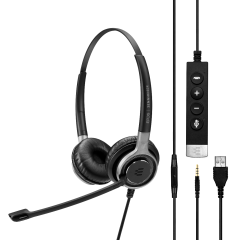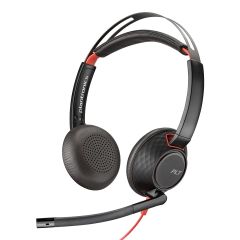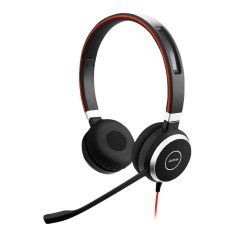USB or 3.5mm: What’s Better for Audio?
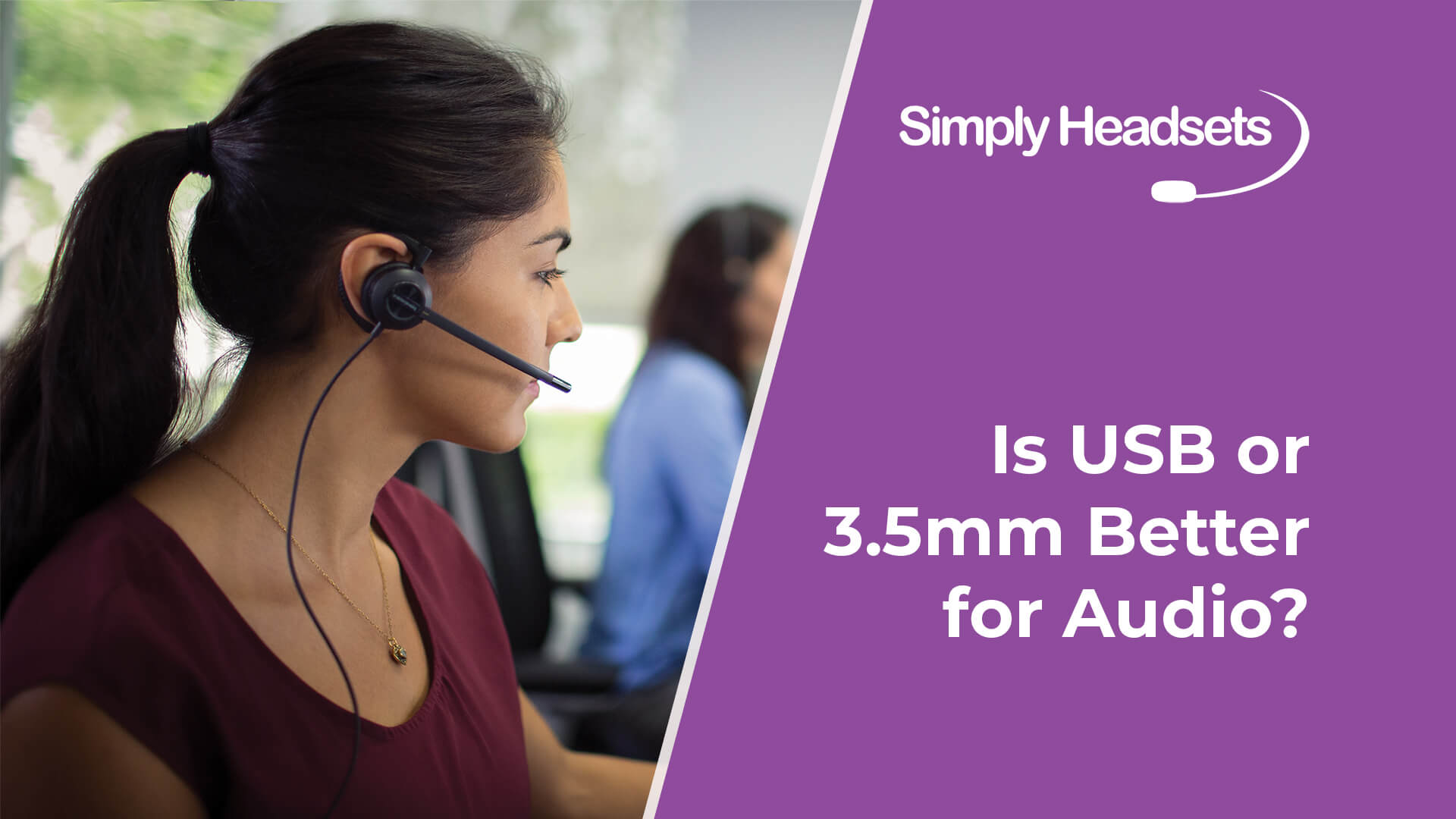
The age-old question is USB or 3.5mm better for audio?
3.5mm (jack) audio connections, also known as auxiliary (AUX) connections, are the traditional analogue audio connection that has been used for decades. Who remembers connecting the old MP3 player to the car stereo in the old Datsun 200B? Just us…? They are generally compatible with a wider range of devices and do not require any special drivers to work – fortunate for all those Datsun drivers…
USB connections are digital connections capable of transmitting audio as well as other types of data. They transmit high-quality digital audio support more advanced features such as remote control and digital signal processing.
So… are USB headsets better than jack headsets?
3.5mm and USB connections both transmit audio, and the choice between the two will depend on your specific needs (80’s silent disco anyone?) and your chosen device. If you are looking for a simple and widely available connection, a 3.5mm jack may be the better choice. If you are looking for a high-quality digital connection that supports advanced features, a USB may be a better option. Let’s take a closer look…
Post Contents [hide]
- How Do USB Headsets Affect Sound Quality?
- Are USB-C Headsets Good for Sound?
- How Do 3.5mm Headsets Affect Sound Quality?
- Which is a Better Headset Connection for Sound and Audio?
- How Do 3.5mm to USB Adaptors work?
- Do 3.5mm or USB Adaptors Affect Sound Quality of Headsets?
- What are the Best USB and 3.5mm Headsets?
- See our Range of 3.5mm or USB Office Headsets

How Do USB Headsets Affect Sound Quality?
Advantages of using a USB headset is the audio is transmitted digitally, which can result in a higher quality sound. Remember the revolution of the CD? And the superior quality of the sound? USB uses digital technology to deliver the same crisp, clear audio.
The quality of the USB connection can affect the sound quality of a USB headset. If the connection is unstable or prone to interference, it can degrade the quality of the audio. Luckily, we have a huge range of quality headsets for you to choose from.
USB audio devices with high-quality DACs (digital-to-analog converters) can produce audio that is indistinguishable from audio played through a traditional audio connection, such as a 3.5mm auxiliary cable.
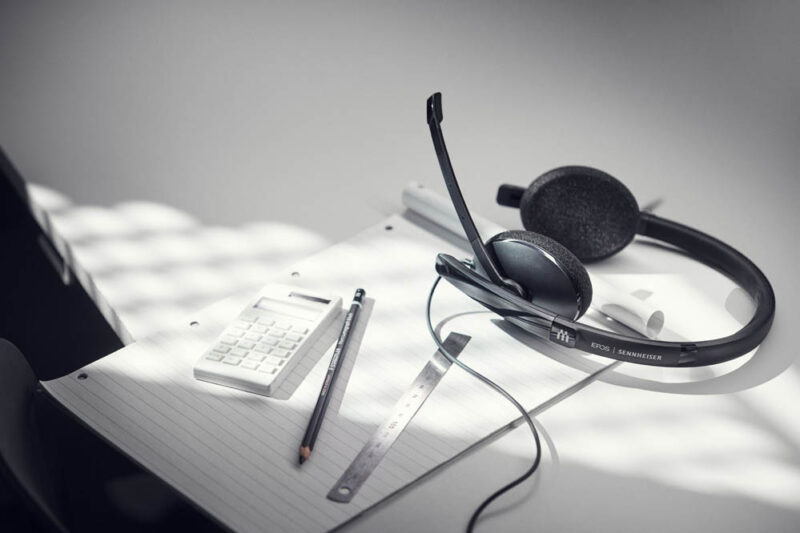
Are USB-C Headsets Good for Sound?
USB-C headsets can be good for sound quality, but it ultimately depends on the specific headset and how well it is designed. In general, USB-C headsets may offer a slightly better sound quality compared to those that use a traditional 3.5mm headphone jack, because the digital signal can be transmitted more accurately over a USB-C connection.
However, the quality of the speakers and overall design of the headset will also play a significant role in the sound quality. Kind of like how a Datsun runs a little bumpier than a new Mazda CX9…
Some USB-C headsets may have better sound quality than others, so it's worth doing some research to find a high-quality option that meets your needs. Check out our range of USB-C Headsets here, we’re sure you’ll find your perfect match!
How Do 3.5mm Headsets Affect Sound Quality?
There are a few factors that can affect the sound quality of a headset with a 3.5mm audio jack:
- A headset with high-quality drivers and construction will generally produce better sound than a cheaply made headset.
- The sound quality of the headset will only be as good as the audio source it is connected to. For example, a high-quality MP3 file will sound better than a low-quality MP3 file played on the same headset.
- A headset that fits well and seals well against the ear will generally produce better sound quality by blocking out external noise and creating a better seal to enhance the bass response.
- In general, a longer cord can introduce more electrical interference, which can degrade the sound quality.
Overall, the sound quality of a headset with a 3.5mm audio jack can vary greatly depending on the factors listed above. We stock quality headsets for use with a 3.5mm jack. Check them out here.

Which is a Better Headset Connection for Sound and Audio?
3.5mm headsets and USB headsets both offer good sound quality, but there are a few key differences to consider.
3.5mm headsets typically use an analogue connection, while USB headsets use a digital connection. This means that the sound signal is converted to digital data when it is transmitted through a USB headset, whereas it remains in analogue form when transmitted through a 3.5mm headset. This can sometimes result in slightly better sound quality with a USB headset, but it is not always a significant difference.
Another difference is that 3.5mm headsets are more widely compatible with a variety of devices, since most devices have a 3.5mm audio jack. USB headsets, on the other hand, require a device with a USB port. This limit the devices the headset can be used with.
Finally, USB headsets often have additional features that are not available with 3.5mm headsets. For example, they may have built-in audio controls or support for advanced audio features like surround sound. These features can enhance the overall sound quality of the headset, but they also tend to be more expensive than comparable 3.5mm headsets.
The choice between a 3.5mm headset and a USB headset will depend on your specific needs and preferences. Both types of headsets offer good sound quality, but there are trade-offs to consider in terms of compatibility, convenience, and additional features.
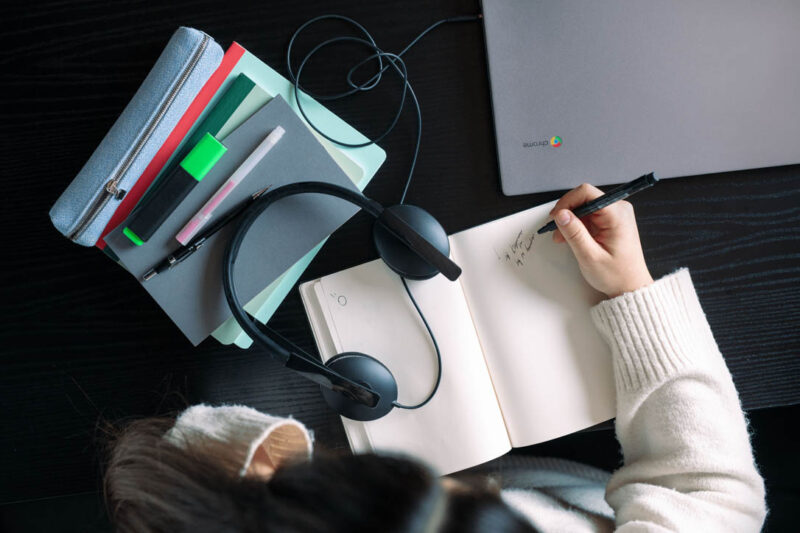
How Do 3.5mm to USB Adaptors work?
A 3.5mm to USB adaptor allows you to connect a device with a 3.5mm audio jack to a device with a USB port. The adaptor has a 3.5mm audio jack on one end and a USB connector on the other end. To use the adaptor, you simply plug the 3.5mm audio jack into the audio device and then plug the USB connector into the USB port on the other device. Never fear, you can get your bad 80’s music fix no matter the connection!
The adaptor converts the analogue audio signal from the audio device into a digital signal that can be transmitted over a USB connection. Some 3.5mm to USB adaptors may also have additional features, such as the ability to accept microphone input or to control the volume of the audio output.
Do 3.5mm or USB Adaptors Affect Sound Quality of Headsets?
The connector shouldn’t affect the sound quality of a headset. The most important factors for sound quality are the headset's audio drivers and overall design.
However, there are some cases where the quality of the connector or the connection itself could potentially affect the sound quality. If the connector is damaged or the connection is not secure, it could result in a poor-quality signal being sent to the headset, which could impact the sound quality. In general, though, you shouldn’t expect a significant difference in sound quality based on the type of connector being used.
What are the Best USB and 3.5mm Headsets?
There are a number of quality USB and 3.5mm headsets to choose from, but to make things easier we're going to list our three top sellers. And the cherry on top is these three headsets each feature a dual connection, meaning they have both USB and 3.5mm! So why choose between the two when you can have both!
EPOS Sennheiser IMPACT SC 665
The Sennheiser SC 665 is a staff favourite here at Simply Headsets. It will work with both computers and mobile devices thanks to its convenient dual cable that features both USB and 3.5mm connectors. It also sports an ULTRA noise-cancelling microphone, so the person on the other end of the line will hear only your voice, loud and clear. This headset is lightweight, super comfortable, and made to last. And it comes with a 3-year warranty to prove it. If you're looking for the best of the best when it comes to corded headsets, look no further.
Poly Plantronics Blackwire 5220
This mid-range USB headset includes a 3.5mm jack which you can connect to a tablet or smartphone. If you have iPhone 7 models and above, you will need to purchase a 3.5mm adapter. The Poly Plantronics Blackwire 5220 is Microsoft Teams certified and has a Dynamic EQ feature that will optimise audio output quality from calls or multimedia. Many headsets cannot adjust well to switching from music to voice call, but you won’t have this problem with the Poly Plantronics Blackwire 5220. Although this headset has soft ear cushions that can help block out background noise, note that it is not an active noise-cancelling headset. Do not worry if you are going to use this all day, as this has a lightweight headband that will fit comfortably and securely on your head.
Jabra Evolve 40
This corded office headset comes with a 3.5mm and USB connection which you can plug into your computer, tablet, or smartphone. If you connect this via a USB connection, you can utilise the headset controls to answer and drop calls as well as adjust or mute the volume. What’s more, when the user is on a call, a light indicator will glow to inform colleagues that he or she is busy. We call this a busy light in the headset world. You can also activate this feature manually if you simply do not want to be bothered. Suitable with softphones, Jabra Evolve 40 is Avaya, Microsoft, Cisco, Skype for Business, and Microsoft Lync certified. It also comes in mono and stereo configurations.

See our Range of 3.5mm or USB Office Headsets
Have we ever steered you wrong? If you’re looking for the absolute best range of 3.5mm or USB headsets, connectors, or perhaps you want some stellar advice on how best to set up your audio needs check out our store or give us a call on 1300 889 728.




